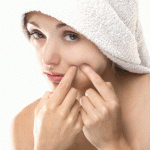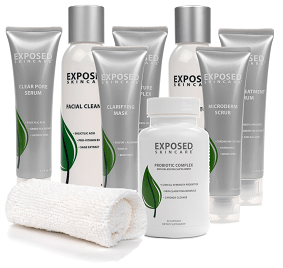RemoveTheScars may earn a small commission if you purchase a product through one of our links (at no cost to you). Learn more.
Acne is a common skin problem and affects many people, both men and women. Acne treatment products, though many in the market, contain harsh ingredients that can dry out the skin. Acne treatments that are proven effective on other types of skin can produce adverse effects on sensitive skin.
Usually, normal skin can bear the impacts, but these ingredients can create an additional problem for sensitive skin. There are, fortunately, acne treatments that are specific for sensitive skin and can clear the skin without causing an allergic reaction. Sensitive skin warrants a sensitive acne treatment.
Sensitive skin is basically a skin that reacts highly to stress. When people, with sensitive skin, experience mental or physical stress, the pituitary gland in the brain discharges a hormone called corticotrophin, which stimulates the adrenal glands as well as the sebum glands.
Moreover, the hormone causes mast cells in the skin to release histamine, which causes allergies. Hence, coping with stress in a proper manner can reduce the intensity of acne.
 Sensitive skin reacts to harsh ingredients by producing oil, which instead of curing the acne makes it worse. The products suitable for sensitive skin should be free from or contain minimal amount of salicyclic acid and benzoyl peroxide as these ingredients can cause severe inflammation of the sensitive skin.
Sensitive skin reacts to harsh ingredients by producing oil, which instead of curing the acne makes it worse. The products suitable for sensitive skin should be free from or contain minimal amount of salicyclic acid and benzoyl peroxide as these ingredients can cause severe inflammation of the sensitive skin.
The products suitable for sensitive skins should contain natural ingredients such as tea tree oil and aloe vera gel, which are effective for acne treatment and are not harsh on the skin.
In addition to the acne problem, the brown spots left after the acne has healed can be a bigger problem than the acne itself. Most lightening products can make the brown spots even darker on sensitive skin. Hence, it is important to choose treatments and alternatives that are suitable for sensitive skin.
In order to deal with acne on sensitive skin, it is recommended to start with small, everyday skin care routine. The face should be washed twice a day, before sleeping and after getting up, with unscented mild soap.
The cleansing products that are suitable for sensitive skins are labelled hypoallergenic and should be preferred. These products are rich in vitamins and contain no dye, perfumes or harsh ingredients and are gentle on the skin. Furthermore, lightweight oil free moisturizers keep the sensitive skin hydrated and balanced, which prevents and cure acne.
Common acne problem will clear up with the use of such products. It is important to note that the timing of applying the products is as significant as the ingredients of the product. The products are more effective in reducing irritation when applied at night after washing and completely drying the skin. A homemade remedy for sensitive skin is to mix a few drops of lavender oil in a bowl of water, soak a wash cloth in it and wash the skin with it.
Lavender soothes and heals the acne and other sensitive skin related issues. In case the problem persists, it is time to see a dermatologist.
It is recommended to change your wash cloth frequently for any skin, but it is highly recommended to use a new wash cloth each time for sensitive skin. It is preferable to use wash cloth made up of lightweight terry cloth or soft cotton flannel.
It can avoid unwanted bacteria from transferring to the skin. Exfoliation is considered a good skin care practice, but sensitive skin is an exception to that. Scrubbing proves to produce harsh impacts on the sensitive skin. Exfoliation scrubbing disrupts acne and spread bacteria which in turn results in more acne, inflammation and redness.
There are new high tech treatments available that use light therapy suitable for sensitive skin and have produced great results in fighting acne. LED light therapy facial is recommended by experts for its ability to restore skin tissue, reduce inflammation and redness. It kills the acne causing bacteria and soothes the inflammation.
Finally, diet has paramount effects on sensitive, acne prone skin. The condition of the skin is highly influenced by the things eaten. Consumption of foods rich in toxins and artificial ingredients can cause skin acne as an attempt to cleanse the body of the impurities. Eating smartly can prevent the breakouts as well as help in cleaning them out.
Sensitive skin requires more care and selectiveness in choosing the skin care as well as acne treatment products. But, with proper skin care practices and smartly chosen products, acne can be successfully treated for sensitive skin.
Amazon and the Amazon logo are trademarks of Amazon.com, Inc, or its affiliates.
